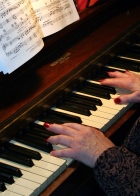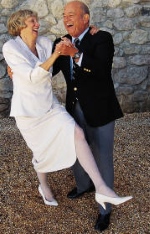Contributing Writer: Rachelle Norman, music therapist and founder of Soundscape Music Therapy
We hear it every day. When we turn on the radio. When we stop into a restaurant or the grocery store. At the beginning of our favorite TV shows, and during the commercial breaks, too.
 If we’re lucky, we’re making music too – singing rock anthems in the shower or Christian hymns during church, dancing with our grandkids, playing the family piano, or fiddling around on guitar.
If we’re lucky, we’re making music too – singing rock anthems in the shower or Christian hymns during church, dancing with our grandkids, playing the family piano, or fiddling around on guitar.
Music infuses every part of our lives, to the point that we aren’t even aware of it all the time. And when our health status changes, music can become an important solace and joy, and the anchor to the world around us.
Music’s Impact on People with Alzheimer’s or other Dementia
Music often has a uniquely powerful impact on individuals living with dementia. In my 12+ years of practice as a music therapist, I’ve seen hundreds of people come alive with music. I’ve heard even more stories from family members and other caregivers who have found music to be one of the best ways to spend quality time with their loved ones, even as dementia steals away more and more of their other abilities and interests.
As neurological imaging tools have advanced, we’ve gained a new understanding of why music has this impact, too. We have been able to see how people’s brains light up when they are listening to music, especially in the emotional and motivational parts of the brain that often survive the longest for people with dementia. Just imagine what we’ll discover when scientists can look at the brain while people are playing in a band or dancing with their spouses!
We know from our own experiences that music is central to our day-to-day lives. We also know from science that music has a uniquely long-lasting impact for people with degenerative brain diseases. So, of course, we want to bring music into the relationships we have with people who have dementia.
The thing is, as with every other aspect of life, a person’s relationship with music shifts and changes as they live with dementia. As caregivers, it’s our responsibility to figure out the best ways to bring music into the picture, for the benefit of our care recipients and ourselves as caregivers.
Bringing Music Into The Caregiving Relationship
What should caregivers do?
First, bring the music. It’s great to start with a person’s favorites, but you can start with anything, really, and determine what appeals to them at this time of their life.
 Second, share in the music. You don’t have to sit down and listen to every note together (and as a caregiver, you probably don’t have time anyway), but you can talk about the music, dance together for a song or two, or hum the melodies with them as you go through the day. You’ll also want to keep an eye out for strong emotional reactions to the music that a person with dementia shouldn’t have to experience alone.
Second, share in the music. You don’t have to sit down and listen to every note together (and as a caregiver, you probably don’t have time anyway), but you can talk about the music, dance together for a song or two, or hum the melodies with them as you go through the day. You’ll also want to keep an eye out for strong emotional reactions to the music that a person with dementia shouldn’t have to experience alone.
Third, recruit some help. You can bring other musicians into the picture, too – cute young family members to do those miraculous toddler dances or first piano recital songs, or a music therapist to provide friendly musical visits or music “lessons” that fit this stage in life. In this way, you give the person with dementia more opportunities to engage in music in a way that’s meaningful to them.
Fourth, don’t go overboard. You can have too much of a good thing, and people with dementia can become overstimulated or frustrated by a constant stream of music. Allow time for silence, too.
Want more ideas and strategies for bringing music into caregiving for people with dementia? Check out Rachelle’s site at: Soundscaping Source.
 About the author: Rachelle Norman has been a making music with older adults and their caregivers for 12 years. A board-certified music therapist, Rachelle works directly with older adults in senior living and hospice, and she serves as a consultant and staff trainer for eldercare organizations across the country.
About the author: Rachelle Norman has been a making music with older adults and their caregivers for 12 years. A board-certified music therapist, Rachelle works directly with older adults in senior living and hospice, and she serves as a consultant and staff trainer for eldercare organizations across the country.
Rachelle is also on the music therapy faculty at Saint Mary-of-the-Woods College, has courses published through Relias Learning and MusicTherapyEd.com, and has an active blog and e-newsletter for caregivers wanting to use music in their work.
If you would like to learn more on this topic, be sure to watch the replay of the Together in This Empowerment workshop where Rachelle shared additional tips:
Connecting and Caring Through Music
If you like what you’ve read, why not receive periodic updates when you:
Subscribe to the TinT Newsletter
Do you have any questions or thoughts? Let me know by commenting below:






Would be very interested in receiving more of this informative information. Thank you.
Hi Lynn, I see you have subscribed to the TinT newsletter so every couple of weeks you will receive information. If you are looking for more information specific to music and dementia care, I recommend you register for the upcoming webinar (see the image/link above). Even if you are unable to attend live, registration guarantees you will receive a link to the replay page which will have more resources.
Music is a vital part of the dementia person’s life – memories, connecting to others including family, calming, energizing, etc. Movement to music is a great way to start the day – using upbeat music and a variety of exercises; MP3 players or I-pods – to calm bring back memories (using headphones of course), live entertainment ( *I have one person who knows every song and sings at all the “paid” entertainment programs, while another one doesn’t speak but sings the songs!! Using music to change the mood is also important – if agitated, using fast paced music and scaling it down to a level that you want to leave them at absolutely works. This is effective during sundowning periods of the day. OR if withdrawn, sleepy, etc, use slow paced music and bring up to a level where they are more awake. This really helps prior to meal times. This is an old music therapy technique and it does work and if you are on a dementia behavior unit it can hep reduce the use of anti-psychotics! Music at the end of life is also effective. I sing and hold the “actively dying” person and teach families how to hold, touch and talk to their family member at that difficult time. I consider this as the final gift I gift to someone before they pass.
Thank you Diane for your great comment with some really good points. Music does have a lot of power over our moods, so when used properly it can be very beneficial as you discuss. It’s also a great opportunity to have meaningful interactions; while I’ve seen the benefits of headphones/mp3 players, I personally believe we should enjoy the music together when possible – avoid the headphones and sing and dance together 🙂